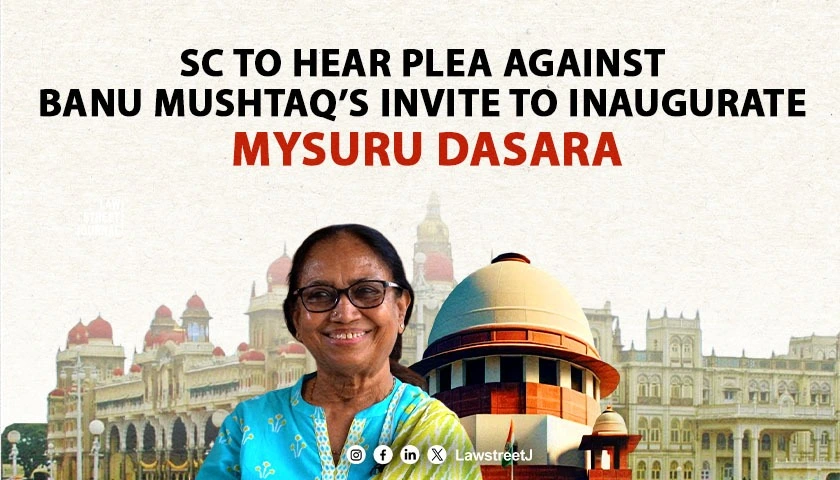NEW DELHI: The Supreme Court on Thursday agreed to consider a petition questioning validity of the Karnataka High Court's judgment, which dismissed a plea against the Congress government's invite to Booker prize winner Muslim writer Banu Mushtaq as chief guest for inauguration of the historic Mysuru Dasara festival.
Advocate Sughosh Subramanyam mentioned the matter before a bench led by the Chief Justice of India B R Gavai.
The court agreed to examine the matter on Friday as the Agra Puja is scheduled on Monday, the counsel informed.
The petition was filed by H S Gaurav challenging the Karnataka High Court's order of September 15, 2025, rejecting the plea against the decision of the Siddaramaiah government. He was one of three petitioners who filed the plea before the High Court.
The petitioners contended that Banu Mushtaq had made ‘anti-Hindu’ and ‘anti-Kannada’ statements at a literary event held in 2023. They also said Mushtaq was invited without even consulting the representatives of the Mysuru royal family.
According to the petitioners, in her speech at the literary event Mushtaq had said that the state had kept her away from Kannada by giving the status of goddess (Bhuvaneshwari) to Kannada language, in a clear indication that she does not have any faith in worshipping a Hindu goddess.
Gaurav's plea contended that the involvement of a non-Hindu in rituals such as deepa lighting, puja, and pushparchane at the Chamundeshwari Temple infringed upon Articles 25 and 26 of the Constitution, hurt Hindu sentiments, and threatened the religious sanctity of the event.
It contended that the High Court has erroneously held that no legal or constitutional right of the petitioners was being violated by extending the invitation to Mushtaq to inaugurate the State sponsored Dasara festivities and participation of a person practicing a particular faith or religion, in celebrations of festivals of other religion does not offend the rights available under the Constitution.
It contended for the inauguration of Dasara in the premises of Goddess Chamundeshwari temple, a puja has to be performed which must be as per Hindu rituals.
"Mushtaq, belonged to the Muslim community and was therefore a non-Hindu. As such, she cannot perform rituals before the deity, which is against established Hindu religious and ceremonial practices," it contended.
The performance of puja by a Hindu dignitary is an essential religious practice protected under Article 25.
"Hence, state interference by altering this practice amounts to violation of fundamental rights of Hindus," it said.
"While the State may support cultural celebrations, it cannot alter or dilute the inherently religious character of a Hindu festival rooted in temple and Agamic traditions," it said.
It also maintained inaugurating a Hindu religious festival inside the premises of a Hindu temple is not a secular activity.
The plea also contended the inauguration by a non- Hindu is against the basic rules of Agama Shastra and the Agama rules, a part of Hindu religious faith and any departure of the traditional rules of worship would result in the disturbance of purity of the ceremony and the divine spirit of the deity and the belief system of the entire Hindu community.
Since the time of the Wodeyar dynasty, the inauguration of the Dasara festival has always been performed by a Hindu dignitary, it said.
On Monday, the high court had dismissed three PILs challenging the decision of the state government. A division bench comprising Chief Justice Vibhu Bakhru and Justice CM Joshi refused to entertain the petitions.
“We are not persuaded to accept that a person from a different faith inaugurating a function organized by the state would violate a legal or constitutional right of the petitioners or any values enshrined in the constitution," the bench had said.
The petitions were filed by former BJP MP Prathap Simha, T Girish Kumar and HS Gaurav, both residents of Bengaluru.
Disclaimer: This content is produced and published by LawStreet Journal Media for informational purposes only and does not constitute legal advice. The views expressed are independent of any legal practice of the individuals involved.

















